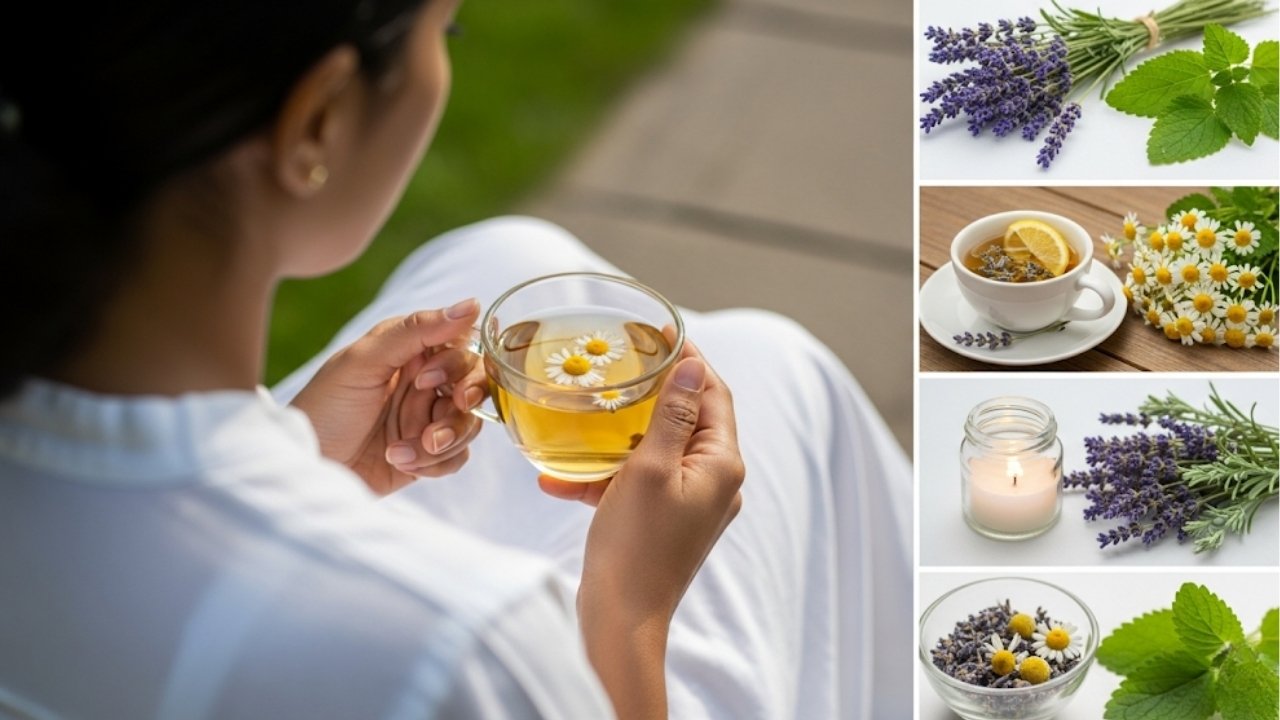12 Herbal Remedies for Stress and Anxiety

We’ve all been there—days when your heart feels heavy, your thoughts race faster than your breath, and even the smallest tasks feel like climbing a mountain. If that sounds like your reality lately, let me gently remind you: you are not alone. Stress and anxiety are now almost like uninvited roommates in our lives. But here’s the silver lining—herbal remedies for stress and anxiety have helped many people find their calm, and they might just work for you too.
When life feels like a storm, herbs are like quiet whispers of peace. I grew up watching my grandmother make herbal teas when she felt “unsettled,” as she called it. At the time, I didn’t get it. But years later, I started brewing chamomile myself after long, anxious workdays. And it helped—not just the tea, but the ritual of slowing down.
Let’s dive into 12 time-tested, research-supported herbs that can help you breathe easier, sleep deeper, and live lighter.
1. Ashwagandha: The Ancient Calm in a Modern World
Ashwagandha is like that wise friend who tells you, “You’ve got this,” when everything’s falling apart. Known in Ayurveda as a powerful adaptogen, it helps your body adapt to stress instead of drowning in it. It doesn’t sedate you—it balances you.
In my own experience, Ashwagandha started working after a couple of weeks. It didn’t knock me out, but I felt less reactive. Things that usually made me panic felt manageable. It’s subtle but powerful.
How it helps:
-
Reduces cortisol (the stress hormone)
-
Improves sleep and mood
-
Enhances mental clarity
| Form | Dose (General) | Best Time to Take |
|---|---|---|
| Powder | 1/2 to 1 tsp daily | Morning or night |
| Capsules | 300-600mg daily | With meals |
| Tincture | As per label | Evening |
Main Keyword: Herbal remedies for stress and anxiety
2. Chamomile: The Sweet Hug in a Cup
There’s something so comforting about chamomile. It’s like a warm blanket on a cold day. Whether you sip it in tea or take it as a supplement, chamomile has a way of softening the edges of your day. It helped me through some of my worst sleepless nights.
Chamomile works by calming your nervous system without making you feel sluggish. It’s especially helpful if your anxiety shows up at night as racing thoughts or tight chest feelings.
Why people love it:
-
Eases nervous tension
-
Aids digestion (stress messes that up too)
-
Encourages restful sleep
Simple tip: Brew 1-2 teaspoons in hot water, cover, and steep for 5-10 minutes. Sip slowly. Add honey if you like sweetness.
3. Lemon Balm: The Mood-Lifter in Disguise
Lemon balm doesn’t get the credit it deserves. It smells fresh and tastes citrusy, but its magic lies deeper. It’s been used for centuries to calm nerves and lift spirits.
I once had a job that gave me stomach cramps from stress. A friend suggested lemon balm tea, and to my surprise, it made a difference. I felt lighter, more focused, and the anxiety cramps faded away.
What makes it special:
-
Helps calm restlessness
-
Eases digestive symptoms tied to anxiety
-
Boosts mood naturally
Pro tip: Lemon balm blends well with other herbs like chamomile and lavender. Create your own evening tea ritual.
4. Lavender: The Scent of Serenity
Ever smelled lavender and felt an instant sense of peace? That’s not your imagination. Lavender is one of the most researched herbal remedies for stress and anxiety, and it works wonders even when you just inhale its aroma.
I keep a lavender sachet on my nightstand and use essential oil during stressful workdays. Just a few drops in a diffuser or bath can flip your nervous system into “rest” mode.
Lavender supports:
-
Nervous system balance
-
Reduced heart rate and blood pressure
-
Improved sleep quality
Easy uses:
-
Inhalation (essential oil)
-
Tea (flowers steeped for 10 minutes)
-
Bath soak (add to warm water)
5. Passionflower: Nature’s Anti-Anxiety Ally
Passionflower isn’t about passion—it’s about peace. This gentle herb is especially helpful if your anxiety comes with irritability or racing thoughts. It has mild sedative effects that make it perfect before bedtime or during high-stress days.
I found it useful when I was overwhelmed during exam season. It didn’t dull my focus—it calmed the mental noise so I could concentrate.
Why it works:
-
Increases GABA (a calming brain chemical)
-
Reduces overthinking
-
Supports sleep without grogginess
Tip: Combine with lemon balm or chamomile for a balanced herbal tea blend.
6. Holy Basil (Tulsi): The Sacred Soother
In Indian homes, Tulsi isn’t just a herb—it’s a sacred presence. Growing up, we were taught to chew its leaves during sickness or sadness. It turns out science agrees—holy basil lowers stress markers and supports emotional well-being.
Holy basil helps regulate blood sugar and cortisol, making it a holistic choice if your stress is also draining your energy or affecting focus.
Why it’s powerful:
-
Reduces inflammation from chronic stress
-
Supports immunity
-
Promotes mental clarity and resilience
Drink it as tea, or take it in capsules—either way, it’s a game-changer.
7. Rhodiola Rosea: The Mountain Herb That Builds Strength
Rhodiola is like a coach that helps your body train for stress. Native to cold regions, this adaptogenic root has been used by athletes and warriors to boost endurance and emotional strength.
When I first tried Rhodiola during a burnout phase, I noticed I had more stamina—not just physically, but emotionally. I didn’t get thrown off by every little thing. I felt stronger inside.
Benefits of Rhodiola:
-
Enhances energy and focus
-
Reduces fatigue tied to stress
-
Balances mood and cortisol
Start with a low dose and take it in the morning. It’s uplifting and energizing, not sedating.
8. Valerian Root: The Gentle Knockout
If you’ve been counting sheep all night, valerian root might become your new best friend. It’s known as a natural sedative that helps with anxiety and insomnia.
It’s strong, though—some find the smell off-putting, but don’t let that scare you. The sleep it brings is deep and refreshing. I use it when anxiety keeps me tossing and turning. A tea or tincture works best before bed.
Why it helps:
-
Promotes deeper sleep
-
Eases anxious thoughts
-
Calms nervous tension
Start small to see how your body reacts, especially if combining with other herbs.
9. Kava Kava: The Social Stress-Buster
Ever get anxious before social situations? Kava Kava is often used in Pacific Island traditions to relax and encourage connection. It has mood-boosting effects that take the edge off without clouding your mind.
I’ve used kava tea before public speaking. It made me feel at ease, grounded, and surprisingly confident.
What it does:
-
Eases social anxiety
-
Relaxes muscles
-
Elevates mood without sedation
Note: Long-term use or high doses may affect the liver. Use occasionally and with care.
10. Skullcap: The Forgotten Nervine
Skullcap isn’t as well-known as lavender or chamomile, but it deserves the spotlight. This herb works quietly but effectively to tone the nervous system, especially for chronic stress or tension.
I added it to my tea blends during a time of deep grief. It didn’t take the pain away, but it softened the overwhelm.
Why it matters:
-
Supports long-term stress recovery
-
Reduces nervous exhaustion
-
Combines well with other herbs
Try it as tea or tincture, especially in the evening.
11. Ginseng: The Energy-Lifting Root
Ginseng isn’t just for energy—it’s also a subtle stress modulator. There are two main types: American ginseng (more calming) and Asian ginseng (more energizing). Both support the adrenal system and help your body handle stress better.
I used American ginseng after recovering from a health scare, and it helped rebuild my energy while keeping me calm and steady.
Ginseng helps:
-
Improve resilience to stress
-
Balance hormones
-
Boost focus and stamina
Pair it with a healthy diet and restful sleep for best results.
12. Hops: More Than Just Beer
Yes, hops—the same flowers used in beer—are a powerful herbal remedy. They help calm the mind and body, especially when paired with valerian or passionflower.
If your anxiety comes with restlessness or irritability, hops might help you chill out. I’ve used hops in tea blends after especially hard days, and it’s like a deep exhale for the soul.
Why hops are helpful:
-
Sedative and calming
-
Supports deep sleep
-
Reduces mental agitation
Avoid if you’re pregnant or sensitive to estrogen, as hops contain phytoestrogens.
Final Thoughts: Listen to Your Body and Go Gently
Stress is loud, but healing is quiet. You don’t have to fix everything overnight. Start small—maybe with a chamomile tea or a few drops of ashwagandha. Notice how you feel. Try different herbs to see what your body responds to. You’re not just treating symptoms—you’re learning how to support your nervous system, naturally and lovingly.
Let these herbal remedies for stress and anxiety be part of your self-care toolkit. Combine them with deep breaths, joyful movement, and kind thoughts. Your calm is closer than you think.
